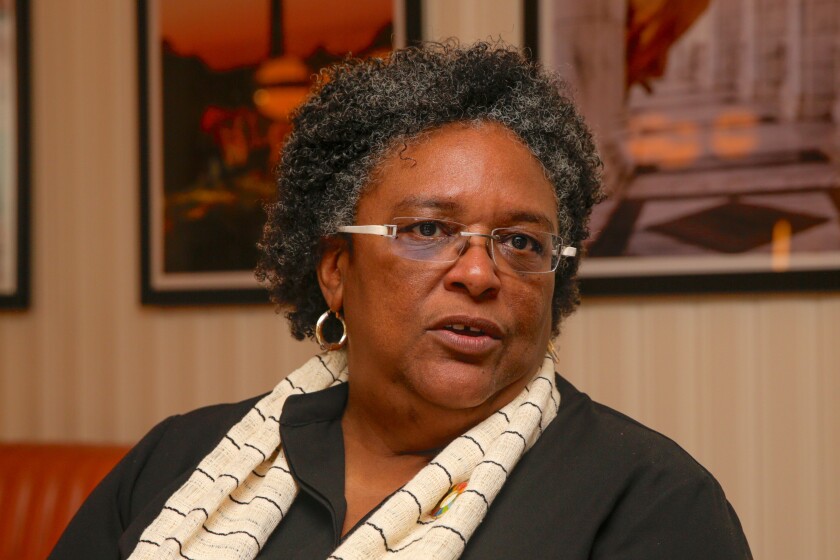The launch of the IMF’s new Resilience and Sustainability Trust (RST) marks a major shift in the institution’s traditional way of lending and moves closer to what climate-vulnerable countries need, senior figures declared yesterday.
But the prime minister of the first country to receive funding from the facility warned that it was far from perfect and called for the World Bank to offer a similar deal as the need for cash for climate adaptation became more urgent.
Barbados prime minister Mia Mottley told GlobalMarkets that through the RST the IMF was recognising that “climate is capable of [causing] as much damage as exogenous financial shocks for most countries”.
“If we don’t find a way of allowing them to become more resilient to these shocks, they will find themselves with increased poverty, economic difficulties and balance of payments [problems],” said the PM.
In September, Barbados became the first country to reach a staff-level agreement on an RST, which became operational on Wednesday and is designed to fund climate resiliency via long-term financing at concessional rates.
The RST marks a transformation in the IMF’s traditional role. It is the first IMF facility to offer long-term funding — Barbados’ $183m loan under the facility is 20 years with a 10.5 year grace period. It also carries significantly cheaper interest than previous facilities. Since Barbados agreed its deal, Costa Rica and Rwanda have also reached staff-level agreements.
“By offering a truly concessional lending window focused on supporting climate change adaptation policies the IMF is moving further away from its traditional role of simply providing balance of payments support to the type of space normally occupied by the MDBs,” said Sebastian Espinosa, managing director at sovereign advisory firm White Oak Advisory.
But RST, which has pledges of $40bn, is only a small step. Espinosa warned that the amounts available under the RST were “modest” compared with what was required by the world’s most vulnerable countries and called for the international financial community to “step up a gear or two”.
“You could even argue that the lacklustre approach of the World Bank and some other MDBs to lending to support climate adaptation has in part brought about the emergence of the RST,” he said.
Mottley said the new approach from the fund was necessary. “When you look at today’s world and ask what would trigger the kind of implosion that the IMF was originally established to be able to fight, you then begin to understand that we either change our mindset and change our arsenal of tools, or we become a victim of the circumstances,” she said.
Imperfect framework
IMF managing director Kristalina Georgieva said this week that the fund was “already in advanced discussions with a diverse group of countries in their climate policy actions”. But although Mottley acknowledged that the RST is “a lot more than what was there prior”, she argued it was “not a perfect framework by any stretch of the imagination”.
“I think we have to claim ground and then work to perfect it even more,” she said.
Oulimata Sarr, minister of economy for Senegal, said the trust “requires you to have a climate assessment, which is done by the World Bank, and most countries trying to access it don’t have it ready and it will take them six months to get it”. “In the meantime, we are in a state of emergency,” he said.
To qualify for the RST, countries need a parallel IMF-supported programme, which may put off some countries that need to use it. This “perhaps speaks more to the fact that you probably need a corresponding type of approach from the World Bank that recognises that middle income countries are vulnerable”, said Mottley.
